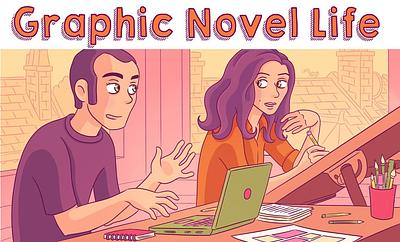After making comics and graphic novels for over twenty-five years we signed with an agent this summer and wanted to share some of our experience.
The right time to find an agent
We began making comics together as Metaphrog in 1994 and self-published for over a decade, before releasing three graphic novels with Papercutz, a small publisher based in New York. Over this time, we've seen an increase in interest in graphic novels. This is understandable, in an increasingly visual culture.
When visiting schools and libraries, especially over the last ten years, we've seen more and more graphic novels on library shelves and more and more comics and manga clubs. Kids love graphic novels! In the US graphic novels have been booming and lots of traditional book publishers now have dedicated imprints for young readers, and lots of agents are representing comic creators.
So, we decided it was time to really focus on finding an agent. The process is pretty much the same as when querying for any other type of book, with one major difference: you can make a pitch packet rather than finish a whole book. Graphic novels are very time-consuming and labour-intensive to create, so it's a lot easier to make changes in the early stages of the process.
Working through rejection
Initially our pitches met with rejection. It was disappointing although we hadn't expected an easy journey. To improve our work, we had our pitch critiqued by a few agents and received very useful feedback. Then members of Kids Comics Studio, the US platform for comic creators' professional development, gave us further feedback on the art, before we tried pitching again.
This initially led to more rejections. Although we also received some positive feedback and encouragement. Just at the moment we were beginning to think we would have to pitch a third time with new material, two literary agents contacted us. We had pitched to one of them, United Agents, in our first round and received a rejection, but this time they offered representation.
Our top tips for getting an agent
If we have one piece of advice: write your best pitch, stick to the agents' guidelines, personalise every query, and persevere. We found response times varied from very quick to extremely slow. And try not to get too discouraged when the rejections pile up. Rejections don't necessarily mean your work isn't good enough, it might just mean that the timing isn't right for a particular agent or for the market. There are so many variables, and this is a very subjective industry.
The important thing to remember is that everyone's experience is unique, there's no recipe or 'how to' but sharing your experiences and making connections can help you prepare for opportunities that come along.
For more insight into Metaphrog's journey to finding an agent, check out the extended blog on their site(this link will open in a new window).
